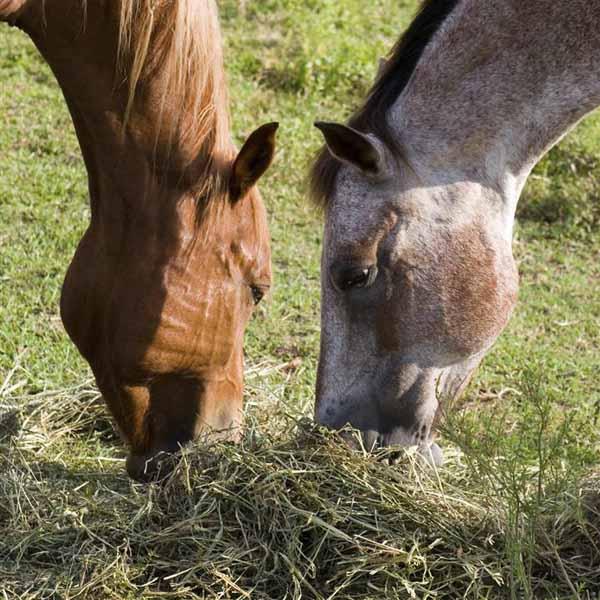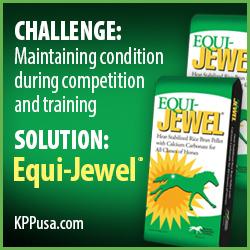
Kentucky Performance Products: Fiber
The key to healthier horses is making sure they have enough fiber in their diets.

Photo courtesy of Kentucky Performance Products
In every aspect of our lives we strive for balance. As owners and caretakers of horses we should also make every attempt to achieve balance in their lives too. We try to balance exercise with stall rest and stall rest with turnout. We try to provide balance in their nutrition as well. Understanding how to balance forage intake with concentrate intake is critical to ensuring optimal nutrition and energy balance. Concentrates are the portion of the diet we typically think of as grains. Concentrates come in many forms, as plain grains (such as oats) or as sweet feeds and pellets. Concentrates often contain added vitamins and minerals that help meet our horses’ overall nutritional requirements.
For decades the concentrate portion of horses’ diets was mostly grain. Either feeding combinations of grains (oats, corn, and barley) or feeding these grains individually was the order of the day. These cereal grains provided energy to the horse almost entirely from starch. Through research and experience we now understand that horses can thrive on a better combination or balance of multiple energy sources, such as fat and fiber.
Traditional concentrates provide small amounts of both fat and fiber from the grain they contain but not in significant quantities, especially compared to their carbohydrate or starch content. A better understanding of how the horse’s digestion system works has revealed that a diet balanced in energy sources can grow and maintain a healthier, stronger, and more relaxed animal. Fiber is an often overlooked energy source that can be included in the concentrate portion of your horse’s diet to better balance his digestion system.
The type of fiber your horse consumes in the pasture or from his hay allowance is the most important part of his daily diet. Significant fiber intake from good quality fresh and dried grasses (hay or hay cubes) is the cornerstone of a healthy horse. But did you know—adding fiber from sources such as beet pulp and soybean hulls can provide extra advantages over hay and fresh grass alone.
The horse’s hindgut plays a significant role in the total nutrition of the horse. The hindgut houses innumerable microbes that digest all the fiber our horses consume. The sources of fiber a horse eats can alter the hindgut’s microbial population, for better or worse. Beet pulp and soybean hulls provide significant quantities of fiber fractions that can change your horse’s hindgut population for the better. These types of fiber can provide significant amounts of growth factors for “good” bacteria that increase the digestibility of your horse’s entire diet. They also prevent the overgrowth of “bad” bacteria in his hindgut. “Bad” bacteria can cause problems such as hindgut acidosis, colic, and colonic ulcers.
To be clear, the “bad” bacteria aren’t always bad. They certainly serve a purpose in the horse’s digestive tract. However, balance is the key to optimal health, growth, and performance. In addition to helping balance the hindgut, the inclusion of alternate fiber sources in the concentrate portion of the horse’s diet also decreases the amount of easily digested starches from grains. That is, when beet pulp is included as an ingredient in the concentrate, then a portion of the starch is removed. Multiple research trials have demonstrated that when a portion of the grain is replaced with a high-quality fiber source, parameters such as glycemic response are lowered and fluctuations in hindgut pH are minimized. Controlling spikes in blood sugar can help maintain a quieter horse, in particular those that must be stalled for extended periods of time. Also, many horses suffering from metabolic disorders benefit significantly from a slower and lower spike in blood sugar. And minimizing hindgut pH translates into a more stable microbial population—which means a healthier, more productive horse—and reduces the risk of colic and laminitis.
Minimizing the quantity of starch from grains and providing beneficial nutrient fractions are two of the ways additional fiber in the concentrate can balance your horse’s nutrition. Read the ingredients tag on the feed bag and look for beet pulp and/or soybean hulls. These high-quality fibers make a difference. If the feed is labeled as “high-fiber” but doesn’t list sugar beet pulp or soybean hulls, then be leery. Research the sources of fibers reported before making a change. Some common feed ingredients that are high in fiber but low in digestibility are rice hulls, oat hulls, peanut hulls, and cottonseed hulls. Poorly digested fiber is not a good alternative and will not support the hindgut in the same manner as quality fiber sources.
A balanced diet that includes good-quality forage from either fresh pasture or hay is the building block to good equine nutrition. From this framework you can build an even more balanced diet for your horse by including fiber sources such as beet pulp and soybean hulls in the concentrate portion. A truly balanced diet will benefit your horse’s digestive system from beginning to end and will support his total health and well-being. Remember: all things in balance.
About Kentucky Performance Products, LLC
Fight back against an energy crisis that can impact condition and performance.
Equi-Jewel® is a high-fat, low-starch and -sugar formula developed to safely meet the energy needs of your horse.
Whether you have a hard keeper that needs extra calories to maintain his weight, or a top performance horse that needs cool energy to perform at her peak, Equi-Jewel can meet your horse’s energy needs. Equi-Jewel reduces the risk of digestive upset, supports optimal muscle function, maintains stamina, and helps horses recover faster after hard work, all while providing the calories your horse needs to thrive.
The horse that matters to you matters to us®.
Not sure which horse supplement best meets your horse’s needs? Kentucky Performance Products, LLC is here to help. Call 859-873-2974 or visit KPPusa.com.






